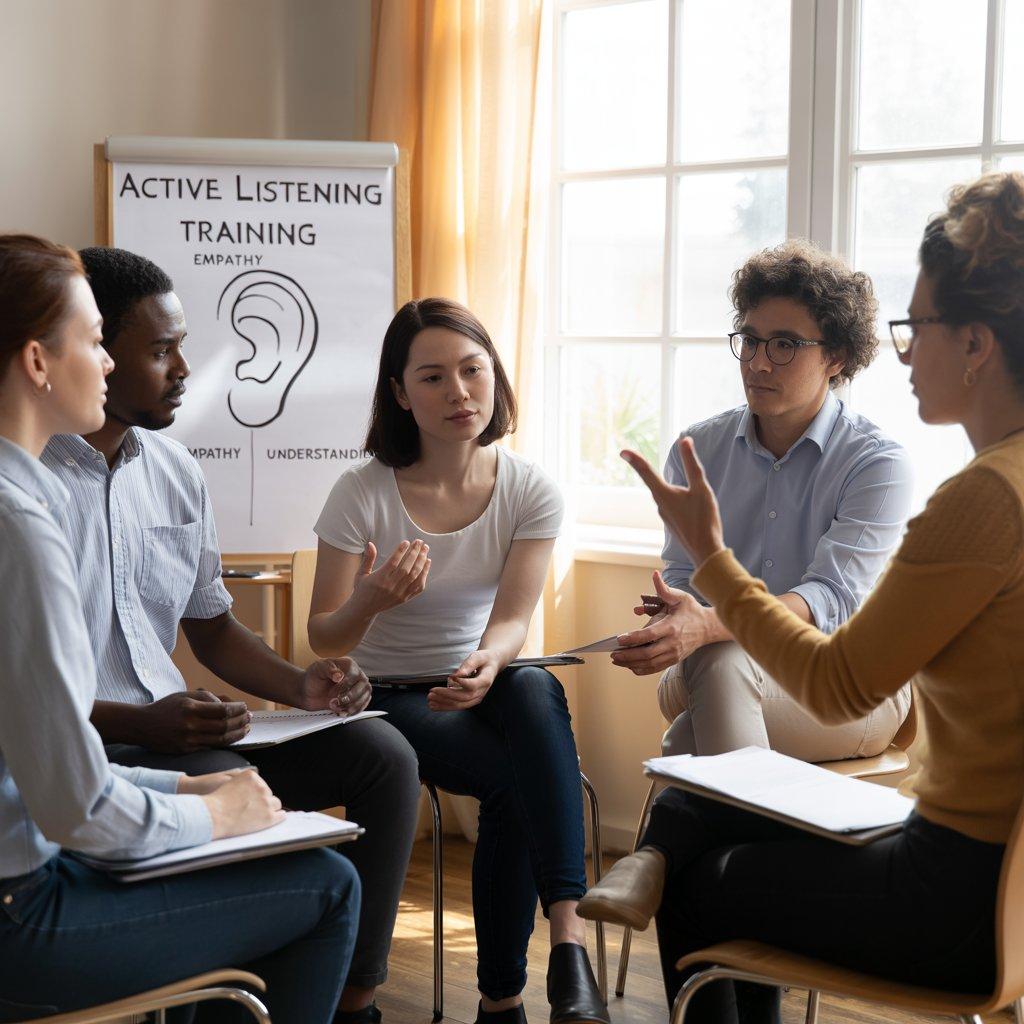Active Listening Skills: A Guide to Effective Communication

In every conversation, there are two roles—one who speaks and one who listens. While speaking often receives more attention, it is listening that determines whether communication is effective or not. Most people believe they are good listeners, but in reality, they may only be hearing words without truly understanding them. This is where active listening skills play a vital role.
Active listening is more than passively hearing; it’s about being fully present, showing empathy, and engaging with the speaker’s message. Whether you are a student, professional, or leader, mastering this skill can transform how you connect with others. In this blog by Unichrone, we provide a complete guide to active listening skills, their importance, techniques, and how to practice them for effective communication.
What Are Active Listening Skills?
Active listening skills involve focusing entirely on the speaker, understanding their perspective, and responding in a way that validates and clarifies their message. Unlike passive listening—where words go in one ear and out the other—active listening requires:
-
Attention
-
Empathy
-
Clarification
-
Reflection
-
Thoughtful responses
Why Are Active Listening Skills Important?
Active listening benefits every aspect of personal and professional life. Let’s explore why these skills matter:
1. Strengthens Relationships
When people feel genuinely heard, they develop trust and emotional connection. Active listening strengthens friendships, family bonds, and romantic relationships.
2. Improves Workplace Collaboration
In professional settings, active listening helps colleagues understand each other, avoid conflicts, and collaborate more effectively on projects.
3. Enhances Leadership
Great leaders are great listeners. Active listening allows leaders to recognize employee concerns, foster engagement, and inspire motivation.
4. Resolves Conflicts
By hearing both sides and validating emotions, active listening helps in conflict resolution without misunderstandings or defensiveness.
5. Boosts Learning and Retention
Students and professionals who practice active listening retain information more effectively, which improves academic and career performance.
6. Elevates Customer Service
Clients want to feel valued. Active listening helps service professionals understand customer needs and provide tailored solutions.
Core Components of Active Listening Skills
To practice active listening effectively, you must develop these core components:
-
Attention – Give undivided focus, avoid distractions, and maintain eye contact.
-
Acknowledgment – Use nods, smiles, or verbal affirmations (“I see,” “That’s interesting”).
-
Clarification – Ask questions to remove confusion and ensure accuracy.
-
Reflection – Paraphrase what the speaker said to confirm understanding.
-
Empathy – Recognize emotions behind words and respond with care.
-
Feedback – Provide thoughtful, respectful responses.
Barriers to Active Listening
Even with the best intentions, several obstacles prevent effective listening:
-
Distractions: Technology, multitasking, or background noise.
-
Prejudgments: Assuming you already know what the speaker will say.
-
Interruptions: Talking over the speaker or finishing their sentences.
-
Emotional Bias: Reacting defensively instead of listening openly.
-
Selective Listening: Only focusing on parts that interest you.
Techniques to Improve Active Listening Skills
Developing active listening skills involves conscious effort and practice. Below are proven techniques:
1. Be Fully Present
Silence distractions, put away your phone, and focus entirely on the conversation.
2. Use Verbal Acknowledgments
Phrases like “I understand,” “That makes sense,” or “Tell me more” encourage the speaker to continue.
3. Practice Reflective Listening
Rephrase what you heard. Example: “So, you’re feeling stressed because of the workload, correct?”
4. Ask Open-Ended Questions
Encourage deeper responses with questions like: “How did that affect you?” or “What do you think is the best solution?”
5. Observe Nonverbal Cues
Pay attention to tone, gestures, and facial expressions. They often reveal emotions words don’t express.
6. Avoid Interruptions
Let the speaker finish before offering your perspective.
7. Manage Emotional Reactions
Stay calm and objective even if the message is difficult to hear.
8. Take Notes When Needed
In meetings, jot down key points to retain information and show attentiveness.
9. Show Empathy
Acknowledge emotions: “I can see why that situation was frustrating for you.”
10. Practice Daily
Like any skill, active listening improves with regular use in conversations.
Exercises to Strengthen Active Listening Skills
Here are practical exercises to help individuals develop and sharpen their listening skills:
1. Paraphrasing Drill
After listening to someone, summarize their points in your own words to confirm accuracy.
2. Silent Listening
Engage in a conversation where you remain silent until the other person finishes speaking.
3. Emotion Identification
Pay attention to nonverbal cues and identify the speaker’s emotions. Validate them openly.
4. Story Recall
Listen to a short story and try to recall key details afterward.
5. Question-Only Conversation
Conduct a conversation where you only ask clarifying or open-ended questions.
6. Mirror Technique
Match the speaker’s body language and tone subtly to build rapport.
Active Listening Skills in Personal Life
Active listening strengthens personal relationships by:
-
Helping family members feel valued and understood.
-
Reducing conflicts between partners by validating emotions.
-
Deepening friendships by showing empathy and presence.
Active Listening Skills in Professional Life
In the workplace, active listening has powerful benefits:
-
Leaders and Managers: Inspire trust and loyalty by listening to employee concerns.
-
Employees: Avoid costly mistakes by understanding instructions clearly.
-
Teams: Collaborate effectively and resolve disagreements peacefully.
-
Customer Service: Deliver exceptional experiences by understanding client needs.
-
Negotiators: Discover hidden priorities and reach win-win solutions.
Active Listening vs Passive Listening
|
Aspect |
Passive Listening |
Active Listening |
|
Engagement |
Distracted, minimal effort |
Full focus, mindful presence |
|
Understanding |
Assumptions made |
Clarified through reflection |
|
Response |
Generic or reactive |
Thoughtful and empathetic |
|
Outcome |
Miscommunication |
Stronger trust and clarity |
Long-Term Benefits of Practicing Active Listening Skills
When practiced consistently, active listening leads to:
-
Deeper personal and professional relationships
-
Higher emotional intelligence
-
Stronger leadership qualities
-
Improved conflict resolution
-
Enhanced problem-solving abilities
-
Greater workplace productivity
How Unichrone Helps Build Active Listening Skills
At Unichrone, we understand that communication is a core professional skill. Our Active Listening Training program is designed to help individuals:
-
Master effective listening techniques
-
Identify and overcome barriers to listening
-
Apply active listening in real-world scenarios
-
Strengthen leadership and teamwork skills
-
Enhance customer service and client relationships
Conclusion
Active listening skills are the foundation of effective communication. By paying attention, clarifying, reflecting, and empathizing, you not only understand others better but also build stronger, more meaningful relationships.
Whether in personal life or at the workplace, active listening eliminates misunderstandings, fosters collaboration, and enhances leadership. With consistent practice and guidance from professional training programs like those offered by Unichrone, anyone can master this essential skill.
Frequently Asked Questions (FAQs)
1. What is the difference between hearing and active listening?
Hearing is the physical act of perceiving sound, while active listening involves focus, comprehension, and thoughtful response.
2. How can I improve my active listening skills?
Practice techniques like paraphrasing, asking open-ended questions, avoiding interruptions, and showing empathy in daily conversations.
3. Why are active listening skills important in leadership?
Leaders who listen effectively build trust, motivate teams, and make better decisions based on accurate understanding.
4. What are some practical exercises to practice active listening?
Exercises like paraphrasing, silent listening, emotion recognition, and story recall are effective ways to build listening skills.
5. Can active listening be taught through training?
Yes. Programs like Unichrone’s Active Listening Training provide structured methods and real-world practice to master these skills.
- Seo
- Art
- Causes
- Crafts
- Dance
- Drinks
- Film
- Fitness
- Food
- Games
- Gardening
- Health
- Home
- Literature
- Music
- Networking
- Other
- Party
- Religion
- Shopping
- Sports
- Theater
- Wellness
- Business & Money

